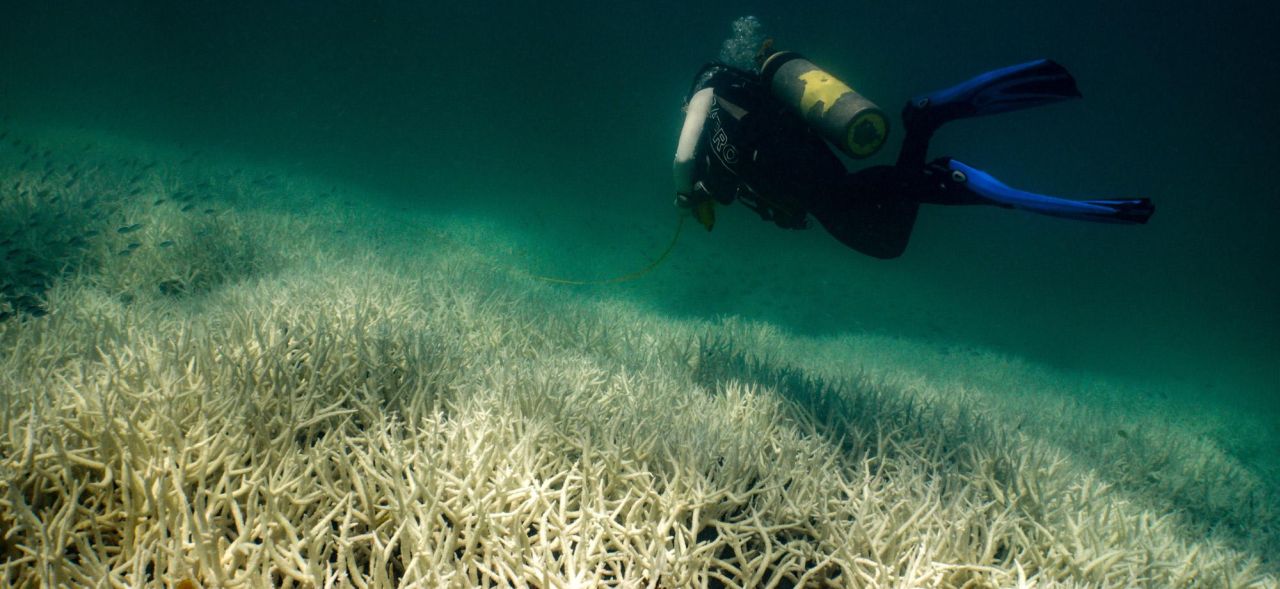Great Barrier Reef Faces Existential Threat, Ocean Temperatures Highest in 400 Years
2024 was the hottest in at least 407 years and 1.73 degree Celsius hotter than the average for years before 1900
The Great Barrier Reef bears the worst brunt of climate change as the ocean temperatures in the region are the hottest in four centuries. A study shows that mass coral bleaching on the Great Barrier Reef in Australia between 2016 and 2024 was triggered by exceptionally high sea surface temperatures, pushing it to the brink of existential crisis. While the mass bleaching events in the reef have been observed since the turn of the century, the recent discovery reveals that the ocean temperatures have reached record high in at least 400 years due to global warming exacerbated by fossil fuel emissions.
Researchers from the Australian Institute of Marine Science studied centuries-old coral in and around the Great Barrier Reef, which keep a record of temperature changes in their skeleton. This data was then matched to the modern findings to ascertain the impact of global warming on the natural habitat.
Published in the journal Nature, the research used climate models to find the extreme temperatures of recent decades. The researchers indicated that the extreme temperatures could not have happened without the greenhouse gas emissions. Intense heat has already led to five mass bleaching events in the past nine years, putting the health and existence of one of the largest living ecosystems on the planet at risk of disappearing.
Sharing a bleak outlook, the scientists wrote in the study that the “existential threat” to the Great Barrier Reef from climate crisis was “now realized.” It was further noted that without strict and immediate cuts to greenhouse gas emissions, this natural wonder would be pushed over the brink of extinction. The study came a fortnight after the World Heritage Committee refused to put the reef on its list of sites “in danger,” citing that it would consider it in a couple of years.
The researchers said that the surveys showed coral cover in the north and central parts of the reef was the highest before the bleaching. It was based on the data accumulated since monitoring began in the early 1980s.

Image: Australian Institute of Marine Science
Scientists built a record of temperatures for the peak three-month (January to March) period for heat for all years from 1618 onward for the study. The outcome showed that 2024 was the hottest in at least 407 years and 1.73 degrees Celsius hotter than the average for years before 1900.
“The reef is in danger, and if we don’t divert from our current course, our generation will likely witness the demise of one of Earth’s great natural wonders, the Great Barrier Reef,” Benjamin Henley, lead author of the research from the University of Melbourne, said in a press release. “The world is losing one of its icons. I find that to be an absolute tragedy. It’s hard to understand how that can happen on our watch in our lifetime. So it’s very, very sad,” he further added.
The scientists at the Australian Institute of Marine Science called the summer of 2024 the most extensive and extreme on record as it caused the fifth mass coral bleaching. Aside from 2024, the five other record-breaking years include 2004, 2016, 2017, 2020, and 2022.
Leading expert on coral bleaching at James Cook University, Prof Terry Hughes, who was not involved in the study, said, “This new study … confirms very convincingly that coral bleaching and mass mortality in the region is a modern phenomenon caused by anthropogenic heating. It blows out of the water the persistent false claims that coral bleaching is somehow normal or cyclical.”
The existential threat to the Great Barrier Reef is not surprising as the rising temperatures always indicated the destruction of the ecosystem. What’s more, is that it is not only the reef systems under attack from global warming. Antarctica is experiencing a heatwave, the people across the globe are living under sweltering heat, and the sea levels are rising. The world has been too slow to take climate action, and it may now be too late.
Via: The Guardian


